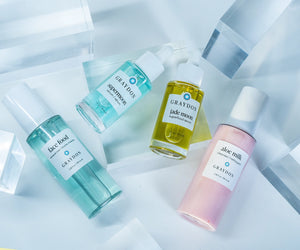Acne is a common skin condition that everyone goes through at least at one point in their life. But for many, the flare ups happen frequently, and at the most unfortunate times. There are many causes of acne and can happen to anyone of any age. Triggers are all around us, from hormones to diet to plain old bacteria. Our first step is to find out what triggers an acne flare up and then find a suitable solution.
Triggers
There are tons of things that can cause a breakout. So it’s important to be aware of what could be contributing to your skin issues. Here are just a few common ones.
Hormones
Our bodies continuously create sebum, which is a natural oil that helps protect the surface of our skin, so during hormone imbalances like puberty or menstruation, your sebum production will increase. The excess oil ends up clogging your pores leading to inflammation and redness aka acne. Hormonal imbalances can happen at various stages in your life thus increasing acne flare ups.
Bacteria
While your initial cause of acne is likely hormonal, your clogged pores could become infected which now makes it a bacterial issue. Now, bacterial acne isn’t an acne of its own, it can be caused by a combination of bacterial overgrowth, inflammation and an increase in your sebum production. People with oilier skin or who tend to neglect skin care are more likely to experience bacterial acne, since those conditions help bacteria thrive.
Diet
Diet is another trigger that can cause flare ups. Now, there’s no exact research that shows what foods are good and bad for your skin, but highly processed and sugary foods may make acne worse. When your blood levels spike, your body automatically produces insulin. Increased insulin means increased sebum production.
Stress
While stress itself doesn’t cause flare-ups, it has been shown to increase the severity of existing acne. When we get stressed out, our body releases a hormone that triggers the overproduction of oil. Having that excess amount of oil can clog your pores, and increase inflammation.
Identifying Acne
Your skin is the largest organ in your body, so why not do everything you can to keep it healthy?
Acne can show up in similar ways, but there are some differences that can help you figure out what kind is present.
Location
The location of your acne may help you indicate what is triggering your breakout. Breakouts found on the lower part of your face, such as your chin, jaw and cheeks are commonly caused by hormones. Bacterial acne is frequently found in oily regions like your T-zone, which is the forehead and nose. But, temple, nose and forehead acne could also relate to digestive issues.
Timing
Keeping track of when your acne is at its worst to see if there’s any pattern is best practice. Menstruation, pregnancy and POS (polycystic ovary syndrome) are common times when hormonal acne tends to worsen since your hormones are fluctuating, meaning that women are more likely to have adult acne than men.
If you started using new skincare, hair or makeup products and are noticing breakouts, that is something else to be aware of and make note of as they could be relating to new flare ups. Same goes for any new foods or drinks you may be ingesting, since some allergies or intolerances come and go as you get older, keeping track of any new thing introduced into your routine can help you identify potential triggers of acne flare ups.
What it looks like
There’s primarily two types of acne, inflammatory and non-inflammatory. Inflammatory, also known as papules, pustules, nodules, and cysts usually reflects underlying inflammation in the body. They may look like red bumps with/without pus, or can be deep under the skin with no head. Whereas non-inflammatory is pore-clogging acne such as white or blackheads, which come with little inflammation and have a greater chance of occurring because of life and product habits.
Treatments

Medications
Medicated acne care may be used as a primary treatment, but only when a dermatologist has found the root cause. Once prescribed it can be helpful, but it’s also important to note that some topical medication can be harsh and end up causing inflammation or damage.That’s why many people find over the counter treatments a more effective way to clear up or manage acne. It’s good to note that in these medications, there are a few ingredients in lower strengths, like benzoyl peroxide, salicylic acid, and adapalene. So, when using any active ingredient, whether it's prescription or not, it's vital to nourish and support your skin's barrier. There are also many over the counter pimple spot-treatments, to help with those pesky one offs!
keeping track of any new thing introduced into your routine can help you identify potential triggers of acne flare ups.
Skincare
A solid skincare routine is essential to help support the skin, keep inflammation down and prevent any additional problems caused by harsh products, or dehydration. Overwashing is a big no-no! If someone has drier, acne prone skin, cleansing once a day is enough and will help to balance skin. If they need to cleanse more than once a day, then a gentle cleanser like Graydon’s Face Foam is what they need. It helps to gently exfoliate and control sebum production with azelaic acid and BHAs. Double cleansing with Aloe Milk first can also be helpful, especially for anyone who wears makeup or mineral sunscreens.
Moisturizing is also essential, no matter the season! Phyto Clear is great for more oil skin types, or to use in the humid summer, while Skin Stuff is an incredible moisturizer for more dry-acne prone types to help keep the skin barrier strong and protected. A compromised skin barrier can also contribute to breakouts, so products with clean ingredients not only benefit your skin, they benefit our planet as well!
Your skin is the largest organ in your body, so why not do everything you can to keep it healthy? We know that acne is a normal part of life, so whether you’re working with a holistic practitioner, a naturopathic doctor, a nutritionist, or a regular dermatologist, identifying the root causes will make all the difference. Trust us, your skin will thank you!


